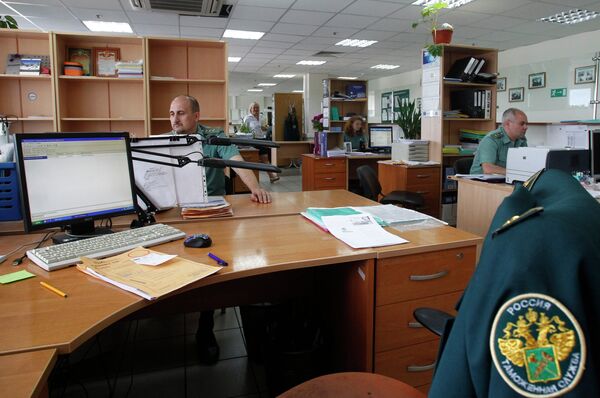KIEV, August 20 (RIA Novosti) – Russia’s customs authorities have notified Ukraine that extra customs procedures for Ukrainian goods had been scrapped days after being introduced, a spokesperson for Ukraine's Ministry of Revenues and Duties said Tuesday.
“We have this information; it is true,” the spokesperson said.
The Ministry of Revenues and Duties said in a statement that the sides have reached “an agreement in principle” and that “the acuteness of the problem has been relieved.”
The Russian Federal Customs Service declined to comment on the information. An anonymous source told the Prime news agency that Russian and Ukrainian officials had indeed addressed the matter.
On July 14, Russia introduced rigorous checks of Ukrainian goods crossing its border. A number of Ukrainian manufacturers said the move de-facto blocked their exports to Russia. The restrictions have also been condemned by Ukrainian lawmakers from across the political spectrum, with some describing the move as part of a “trade war.”
The Federation of Employers of Ukraine, which represents the interests of thousands of companies that together account for some 70 percent of Ukraine’s GDP, has said that if the customs changes were permanent they could cost Ukrainian companies more than $2.5 billion by the end of this year.
According to Russia’s rail monopoly RZD, about 900 freight train cars were stuck at the Russian-Ukrainian border as of August 16, but their number is gradually dwindling.
Russian presidential adviser Sergei Glazyev said Sunday that the new customs restrictions had been implemented because of the possibility of the EU and Ukraine signing an EU-Ukraine Association Agreement and establishing a Deep and Comprehensive Free Trade Area (DCFTA) at a summit scheduled to take place in Vilnius in November.
“We are preparing to tighten the customs regime just in case Ukraine takes the suicidal step of signing an agreement of association with the EU,” Glazyev told reporters Sunday. He added that the new customs measures would be required because European and Turkish goods, which would flood into Ukraine after the signing of such a deal, could be re-exported to Russia.


